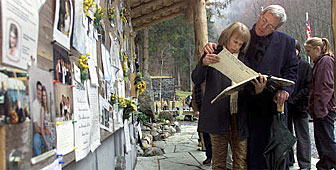Relatives visit “beautiful, peaceful” canyoning memorial

The victims' relatives attending the trial in Interlaken took time out from the proceedings to visit the Canyoning memorial park.
On a rainy, melancholic afternoon, about a dozen relatives drove to the memorial park set up beside the Saxet Brook, where the 21 foreign tourists and guides lost their lives two and a half years ago.
The park consists of a wooden shelter housing a message board, a large memorial stone placed beside 21 smaller stones taken from the river to represent each of the victims and a concrete bench in the shape of a boomerang.
“It’s very emotional for us all to come back here very close to the river where it all happened,” said the Australian, Paul-Scott Smith, who lost a daughter, “but they’ve built this memorial for the children of ours and it’s a lovely peaceful place. They’ve done a good job making this memorial.”
Smith and his wife, Bronwyn, pressed smiles through their tears as they looked at the pictures of the victims and countless messages of love posted on the message board.
Wall of messages
Rachel O’Brien, a survivor of the accident, tacked a new message to the wall.
Anton Du Raan from South Africa took photographs. “It’s nice to meet the other family members,” he said. “Just to comfort each other to know that there are other people that are feeling the same as you.”
“It definitely helps to talk to other people about it, knowing that they are going through the same kind of emotions.”
Du Raan came with his brother Chris to mourn the loss of a third brother, Jan.
“In a sense his soul is here,” said Chris du Raan. “That’s part of why we came.”
The du Raans read some of the messages, paid their last respects at the memorial stone and looked one last time into the river.
“I always feel very sad when I come to this spot but I also recognise it as a beautiful place, which helps,” said another relative, Geoffrey Havard from Britain.
“Before anything like this ever happens to you,” Havard said, “even when you’ve got children, you say to yourself, ‘I know how they must feel because I have a child’ you don’t know how it feels until you lose a child, you really don’t.”
by Dale Bechtel in Interlaken

In compliance with the JTI standards
More: SWI swissinfo.ch certified by the Journalism Trust Initiative

You can find an overview of ongoing debates with our journalists here. Please join us!
If you want to start a conversation about a topic raised in this article or want to report factual errors, email us at english@swissinfo.ch.